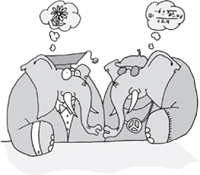CHAPTER THREE
Feelers Think and Thinkers Feel
He is happy whose circumstances suit his temper, but he is more excellent who can suit his temper to any circumstance.
—David Hume
There once was a thinker named Fred
He managed by using his head
Until a feeler named Dawn
Said she felt like a pawn
So he flexed in the way that he led.
I want to share with you a widely adapted parable of three blind men and an elephant, originating in ancient India. If you already know it, feel free to chime in. It goes something like this.
There are three blind men, each touching the same elephant—one at the tusk, one at a leg, one at the tail.
Each then describes the elephant by generalizing from the area he is feeling. They are in complete disagreement. The man feeling the tusk says an elephant is like a smooth pipe, the man at the leg says an elephant is like a pillar, and the man at the tail describes an elephant as being like a rope.
The three blind men approach the king to resolve their conflict. The wise king responds by saying they are all correct. He explains that an elephant has all the features described; they merely had different interpretations based on their vantage points.
The king maintained that people with a variety of perspectives can live harmoniously and truth can be described in different ways.
Keep this metaphor in mind as we proceed.

Feel-lings… Nothing More than Feelings!
A BRIEF, SENSITIVE HISTORY OF FEELERS
Three things in human life are important. The first is to be kind. The second is to be kind. And the third is to be kind.
—Henry James
Just had to title this section with the Feeler National Anthem, alternative submissions welcome. You looking for something to appreciate today? Be glad this isn’t an audiobook; I’ve been arrested for singing (among other things best left forgotten).
To shed some light on the F mind, I’ve put together a composite Q & A based on conversations with Fs at the workplace. The thinker section begins with a sample of T’s distinctly divergent responses.
Q: Who bugs you?
A: Mean people.
Q: What do you want to say to them?
A: Why are you so mean? Would it kill you to be nice? How would you like to be treated that way?
Q: Really! Would you actually ask those questions?
A: No. It might hurt their feelings. Plus, I really don’t want to get in an argument.
Q: What motivates you as a manager?
A: Making people who work with me fulfilled and happy in a caring environment where everyone is respected. I like making meaningful connections with my team.
Q: How can you flex your style to increase cross-temperament effectiveness?
A: I can TRY to not take things personally that supposedly have nothing to do with me… or to at least pretend I’m not upset.
Cut. That’s plenty of data to get us started.
Feelers, I have a word of wisdom. It is a tough nut to swallow. Accept—even if you don’t understand or like—this fact of life:
A whole bunch of people do not focus—at all—on feelings!
Feelings are not numero uno for everyone. Incredible, I know. Thinkers go about their business… well, going about their business. Allow yourself a moment of envy; it’s okay. Can you imagine how freeing that would be? Now let it go; you are who you are.
And so are they.
They. Are. Not. Jerks.
They are practical, pragmatic, logical doers. They are darn handy to have around, believe you me. The more the merrier. As an aside, thinkers are generally extremely useful in a crisis. Learn to value and get along with thinkers.
Listen to what I am telling you here—I’ll say it one more time for emphasis: Not everyone cares about feelings. This is a concept so foreign to off-the-chart feelers that it is nearly impossible to comprehend. So don’t bother really trying to get it. Do yourself a favor and just believe it’s true.
Now that we’re on the same train, what are you going to do about it?
Don’t bother answering; I will for you. You are going to carry a Q-tip everywhere you go.
What?
You heard me correctly. Go get a Q-tip. No, get a whole handful of them. Put one in your briefcase, one in your top left desk drawer, one in your pocket (take it out before washing), one in your car. You take it from there.
Perhaps you’ve never been let in on this well-kept (until now) secret. Q-tip is an acronym created exclusively for feelers.
That sounds a bit harsh at first. Judgmental, even. Put that luggage aside and be brutally honest with yourself. Let’s make it real. You do take an awful lot personally. Remember the time that managing director didn’t look at you in the elevator, the same one you thought you’d bonded with at the quarterly meeting? What about when the CEO avoided eye contact with you at the holiday party? Or the time four people in your department went out to lunch and you weren’t invited? How about when the entire team you supervise celebrated completing the big project last year and no one thought you might like to join in? That was over a year ago!
Think of how much easier work would be if you took a lot fewer things to heart.
Want to hear something funny? When I bestow Q-tips on my F clients, they nearly always thank me warmly upon receiving this diminutive gift, even before they know why it is being given. The appreciation Fs have for the little things in life counterbalances their sensitivity on the other side. When meaning is piled on top of an otherwise run-of-the-mill Q-tip, I’ve caught Fs carrying it everywhere or prominently propping it on their desk. If Fs love anything, they love Meaning.
Fs’ brains are whirling constantly, always processing the world around them. This trait makes them sensitive, perceptive, and often complex people.
And with that…
A Fact’s a Fact
A BRIEF, PRACTICAL HISTORY OF THINKERS
I think, therefore I am.
—René Descartes
Thinkers lead with their heads.
Hey, all you thinkers out there, raise your hand if you bothered to read the section on feelers rather than breezing past it to get to your segment. One… two-o-o…
I need to have a word with you. While I appreciate your honesty, I will now proceed to convince you it is in your own best interest to learn as much as you can about the feeler species and habitat.
How persuasive is the following? Grade my efforts:
It is important to care about your staff, to show them you really
like them as people. You’ll also feel better about yourself
by demonstrating your warmth toward others.
I hope you gave me a failing grade.
I wrote that just for kicks. I wanted to fail at convincing you. That’s what a writer does for laughs to break up the tap-tap-tap on the keyboard. And half those taps are the backspace key.
Although the appeal above may work for a feeler, it nauseates a thinker. Or at least leaves you cold. Ahead is my second effort to convince you to read the feeler section.
Take two.
Educating yourself about feelers and what motivates
them will increase their productivity. Also, you will become
a more efficient manager while expending fewer resources.
Better? Convinced? Now I hope you understand why it’s worthwhile for nonfeelers to read the segment “Feel-lings… Nothing More than Feelings.” That title, by the way, is an exaggeration. Feelers are more than feelings. Okay, now scram. Then come directly back here when you’ve finished your catch-up assignment.
Now that you’ve at least skimmed the feeler section, you may be wondering why I didn’t persuade the feelers to read this segment. They know the answer: Because they are already reading it.
It’s time for our composite Q & A based on conversations with Ts on the job. Same questions as for the Fs, quite different responses.
Q: Who bugs you?
A: People who bring their feelings to the workplace.
Q: What do you want to say to them?
A: Grow up! We’re all adults here. Leave your emotions at the door; we have a job to do.
Q: Really! Would you actually say that?
A: I would, except they’d make such a big deal out of it. It probably wouldn’t be worth the effort.
Q: What motivates you as a manager?
A: Excelling. Pushing my staff beyond previous limits. Being fair and forthright.
Q: How can you flex your style to increase cross-temperament effectiveness?
A: I could probably thank people more, if I remember. It’s really not my thing to go around complimenting people. It seems phony. I mean, we get paid to do our jobs.
Accept—even if you don’t understand or like—this fact of life:
A huge herd of people cannot turn off their emotions at will!
I understand this is extremely alarming. It does no good to dispute or be annoyed by this fact. It won’t ever go away! You’re a smart cookie. You know better than to pound your fist on the desk—at least, for longer than a few minutes.
You are left with a single rational (gotcha with that word!) option: Work with it. No one is going to change to accommodate your will. You know that. You want to manage as efficiently as possible with maximum positive return on the investment of your time, energy, and resources.
Take this advice: Learn how to deliver timely, specific, sincere positive feedback to your direct reports. Put it on your to do list until it comes naturally. Demonstrating appreciation is a fast, free way to improve morale and productivity. Plus, it takes virtually zero time.
You’ll thank me later. Or whatever; save it for your team.
It’s easy to be lured into the urban legend that feelers don’t think. Nothing could be further from the truth, I assure you. They are thinking all the time. Constantly. Hardly a moment passes that feelers aren’t thinking.
(Mostly about their feelings, but never mind that.)
Another temptation is the reckless assumption that Fs are incapable of making tough decisions, or at the very least, good decisions. That’s a popular T bandwagon, and it’s oh so enticing to hop aboard. Resist!
There is zilch evidence that Ts make better decisions than Fs. Each species just goes about the deciding of stuff really differently. Ts base important decisions primarily on facts. Fs make big decisions based on… you guessed it… their feelings!
This may irk you. Yet, take hiring as an example. Tracking retention rates across industries, there’s no discernible difference in success between managers who hire primarily based on “a good feeling” and those who select candidates based on objective criteria.
Now that we’ve highlighted the big ol’ differences between Ts and Fs, let’s see what happens when we toss gender into the mix.
 Men, Women, and Stereotypes
Men, Women, and Stereotypes
By now you could be thinking, “Hmm… I wonder if there is a gender bias in all this.” Don’t feelers sound suspiciously like clichéd women and thinkers like stereotypical men?
Yes. And no.
The Myers–Briggs Type Indicator (MBTI)manual breaks it down like this:
![]() General overall population
General overall population ![]() 40 percent thinkers, 60 percent feelers
40 percent thinkers, 60 percent feelers
![]() General female population
General female population ![]() 24.5 percent thinkers, 75.5 percent feelers
24.5 percent thinkers, 75.5 percent feelers
![]() General male population
General male population ![]() 56.5 percent thinkers, 43.5 percent feelers2
56.5 percent thinkers, 43.5 percent feelers2
As an MBTI certified practitioner for nearly twenty years, I’m more or less obsessed with Myers–Briggs. I follow the ebb and flow of population trends with the rapt attention of my son watching stats during the draft of his fantasy basketball league.
It’s an exciting life, what can I say?
When I was studying for my first MBTI certification, the numbers were about 50/50 overall, with 65 percent of men testing as thinkers and 35 percent as feelers. Reverse it for women: 35 percent were thinkers and 65 percent were feelers. Somewhere along the way, and for a number of years, the statisticians told us there was no gender bias in T/F, that men and women were equally likely to be thinkers or feelers. This seemed a bit surprising to me; however, I went along with it, being the cooperative person I am. Yet current statistics swing in the other direction altogether! This is breaking news. Jump up and down, or at least swirl your arm in a couple circles, would ya?
Let’s take these stats at face value. The way things land now; three-quarters of women are primarily feelers (keep in mind significant variation between mild, moderate, and strong preferences). Just a bit more than half of men are thinkers—meaning, of course, that just a bit less than half are feelers.
Feelers are taking over the world!
I’m as surprised as the next person. If this doesn’t count as headline news, I don’t know what does. I understand this is a highly disturbing tidbit of information to the thinkers of the world. I feel your pain. I mean, I think you will make it through. I know you will. Just don’t take it out on the feelers, okay? It’s not their fault, even though it is tempting to blame them. Especially since most Fs will apologize regardless.
Despite general populace statistics, every workplace is self-selecting and therefore apt to vary from standard percentages. For example, the Department of Justice is likely to have a higher percentage of male and female thinkers, and an animal shelter will have a disproportionally large percentage of feelers from both genders.
Where do problems arise for managers in the T/F stats? As you already deduced, stereotypes dictate that feelers encompass female characteristics, and thinkers sound suspiciously like a typical male prototype.
These associations are supported to a degree by the statistics—more women are feelers and more men are thinkers. That does not discount the fact that plenty of dominantly thinker women and dominantly feeler men exist, all over the place. Because the idea of a feeler male or a thinker female flies in the face of expectations, these folks face extra challenges as managers.
What can you do about this, you maverick female Ts and male Fs? It helps to have an awareness that your style is not typical for your gender, that it can cause some people to misunderstand or unfairly judge you. It’s best to not let this aggravate you. Know it may happen, and let it go. That said, female Ts can heed feedback about “taking the edge off” in certain situations and male Fs can practice taking a well-researched, strong stance on important matters. Find a comfortable balance while remaining true to who you are.
She & He

The typical expectation is that women are feelers and men are thinkers. The statistical majority in both genders reinforces these assumptions. The result is an undercurrent of largely unconscious, unintentional prejudice against male feelers and female thinkers.
A. When most people meet a manager who happens to be male with strong thinker traits, what kinds of words do you suppose they use to describe his leadership style?
1.
2.
3.
B. When people meet a female manager with strong feeler traits, what words might be used to describe her?
1.
2.
3.
C. Now let’s flip it. How might one describe the management style of a man who happens to be a strong feeler?
1.
2.
3.
D. And what about that female manager who exhibits strong thinker traits? How does she get pigeonholed?
1.
2.
3.
I have conducted this activity with countless managers. Typical descriptors for A are strong or decisive. For B, kind or caring. For C, weak or incapable. For D, cold or insensitive.
The very characteristics lauded in male thinker managers, such as being tough and firm, are frequently judged as negative traits in women. Conversely, when male feeler managers exhibit traits appreciated in female feelers, the men are often criticized for being too “soft.”
As managers, we can hold ourselves responsible for noticing and reversing stereotypes as they occur in ourselves and in others.


